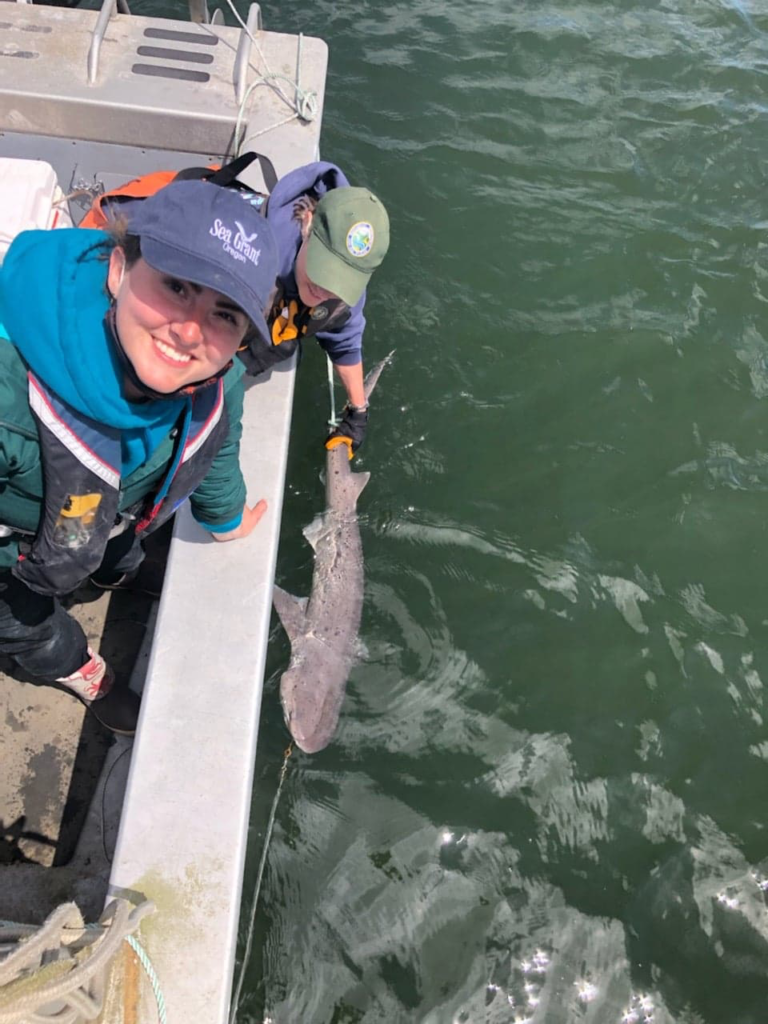It’s June and we’re in the depths of field season!

My project focuses on incorporating broadnose sevengill sharks into ecosystem modeling in the northern California current ecosystem, which encompasses the coasts from San Francisco up to British Colombia. Historically, predators, in general, have not been included in our understanding of the Pacific Northwest coastal ecosystems (the few studies done have focused on orcas or pinnepeds such as sea lions). So, very little is known about sharks in this region. The broadnose sevengill is a large (up to 10 ft/3 meters and 230+ lbs/107 kgs), apex predator in other locations around the world. I suspect they play a similar role here in Oregon and Washington…especially when it comes to our very important local fisheries, like salmon, halibut, and crab! To find out, I am tagging sevengills with acoustic tags (to track movement) and taking tissue samples (to determine what they’re eating over different periods of time, using stable isotope and stomach content analysis).


Since April, I’ve been going out once a month to look for sevengill sharks in Willapa Bay, WA. Sevengills – which live in temperate waters – show up seasonally in certain bays around the world. Willapa Bay, the second largest BAY on the west coast of the United States, is one of those specific bays. We’re not sure why sevengills show up there, but we do know that Willapa is also an important estuary for many species, including salmon, Dungeness crab, harbor seals, as well as Endangered Species Act-listed green sturgeon. Originally we thought that the sevengills showed up in June or July. But after doing some reading of some previous studies, I suspected that they might be showing up as early as April. And if they were, I wanted to sample them.
So out we went in April. Three days on the water and…..nothing! I was confused. I thought they’d be here! Maybe I’m just wrong? After talking with some local fishermen, though, we discovered…the local Chinook salmon run was running late. Maybe related? Unknown. We went home empty-handed.
In May, we returned. Before we got on the water, a local fisherman revealed…the salmon are here! Okay, but where are the sharks? Unknown. We got out on the water and spent most of the day fishing for sharks. Waiting waiting waiting. Right as I was about to give up — tug tug tug. “Did I catch a stick?” I pulled up my line and…..SHARK! It’s a sevengill! They’re here! I almost cried (a moment captured perfectly on camera by my advisor). How exciting!!! We caught two more sharks that day. AND we detected previously tagged sharks…from 2021! They are here! Which begs the question. What are they doing though? Unknown!

Is it related to the salmon, or is it something else? Still unknown. But that’s what I’m trying to find out. Stay tuned (links below to keep up with me and my lab on social media)!



Yay! A shark! and a recapture, too. So exciting, Jess. Can’t wait to see what the rest of this field season brings you.
How has the 2023 season gone? I hear that someone found sevengill sharks in southern Puget Sound in Hammersley Inlet near Harstine Island. Any chance that group mixes with the ones you are tracking?
Great question! Actually, the first picture in this blog is of a sevengill in the Puget Sound…we were part of the team who confirmed them! Very exciting! There *is* a chance that the Puget Sound sevengills mix with the Willapa ones, but we won’t know until we process the genetic samples. So, TBD!